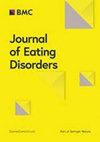A systematic scoping review of carer accommodation in eating disorders
IF 3.5
3区 医学
Q2 NUTRITION & DIETETICS
引用次数: 0
Abstract
The accommodation of eating disorder (ED) behaviours by carers is one of the maintaining processes described in the cognitive interpersonal model of anorexia nervosa. This systematic scoping review aimed to explore studies examining accommodating and enabling behaviour, including how it impacts upon the carer’s own mental health and the outcome of illness in their loved ones. In this systematic scoping review, five databases (PubMed, Web of Science, MEDLINE, PsycInfo, CINAHL) were searched for studies measuring accommodating and enabling behaviour in carers of people with EDs. A total of 36 studies were included, of which 10 were randomised trials, 13 were longitudinal studies, nine were cross-sectional studies and four were qualitative studies. Carers of people with EDs were found to have high level of accommodating and enabling behaviour which reduced following treatment, although no single type of intervention was found to be superior to others. Higher accommodation in carers was associated with higher level of emotional distress, anxiety and fear. There was mixed evidence around whether accommodating and enabling behaviour in carers impacted the outcome of illness in their loved ones. Accommodating and enabling behaviours are frequently seen in carers of people with AN, and carer-focused interventions are able to reduce these behaviours, although it is unclear if any intervention shows superiority. There may be nuances in the impact of these behaviours related to interactions within the support network and variations in the forms of co-morbidity in patients. More studies with a larger sample size and which include both mothers and fathers are required. Eating disorders are complex mental health conditions which also significantly affect the physical health of patients and the carers who support these patients. In this systematic scoping review, the authors have examined the impact of eating disorders on carer's emotional reactions and behaviour towards the eating disorder symptoms, namely accommodating and enabling behaviour towards the illness. For this review the authors searched for published studies that examined accommodating behaviour in carers of people with any type of eating disorder, which includes studies such as randomized trials, longitudinal studies, cross-sectional studies and qualitative studies. Higher levels of accommodation in carers was associated with higher levels of their emotional distress, anxiety and fear. Accommodating and enabling behaviours reduced with treatment although no single type of intervention was more effective in this regard than others. There was mixed evidence for the impact of accommodating and enabling behaviour in carers on the outcome of eating disorders in the patients.关于饮食失调症护理者住宿问题的系统性范围界定审查
照顾者对饮食失调(ED)行为的迁就是神经性厌食症认知人际关系模型中描述的维持过程之一。本系统性范围界定综述旨在探讨有关迁就和促成行为的研究,包括这些行为如何影响照顾者自身的心理健康及其亲人的疾病结果。在本系统性范围界定综述中,我们检索了五个数据库(PubMed、Web of Science、MEDLINE、PsycInfo、CINAHL)中有关 ED 患者照顾者迁就和促成行为的研究。共纳入 36 项研究,其中 10 项为随机试验,13 项为纵向研究,9 项为横断面研究,4 项为定性研究。研究发现,ED 患者的照顾者有较高程度的迁就和帮助行为,这些行为在治疗后有所减少,但没有发现任何一种干预措施优于其他干预措施。照顾者的高度迁就与较高程度的情绪困扰、焦虑和恐惧有关。关于照顾者的迁就和助长行为是否会影响其亲人的病情结果,证据不一。照顾者的迁就和纵容行为经常出现在自闭症患者的照顾者身上,以照顾者为中心的干预措施能够减少这些行为,但目前还不清楚是否有任何干预措施显示出其优越性。这些行为的影响可能存在细微差别,这与支持网络中的互动以及患者共病形式的不同有关。需要进行更多的研究,样本量要更大,并同时包括母亲和父亲。进食障碍是一种复杂的精神健康问题,同时也会严重影响患者和支持患者的照顾者的身体健康。在这篇系统性的范围界定综述中,作者研究了进食障碍对照护者对进食障碍症状的情绪反应和行为的影响,即对疾病的包容和支持行为。在本综述中,作者搜索了已发表的研究报告,其中包括随机试验、纵向研究、横断面研究和定性研究等,这些研究对任何类型饮食失调症患者的照顾者的迁就行为进行了研究。照顾者较高程度的迁就与他们较高程度的情绪困扰、焦虑和恐惧有关。虽然没有任何一种干预措施比其他干预措施更有效,但照顾者的迁就和助长行为会随着治疗的进行而减少。关于照顾者的迁就和纵容行为对患者饮食失调结果的影响,证据不一。
本文章由计算机程序翻译,如有差异,请以英文原文为准。
求助全文
约1分钟内获得全文
求助全文
来源期刊

Journal of Eating Disorders
Neuroscience-Behavioral Neuroscience
CiteScore
5.30
自引率
17.10%
发文量
161
审稿时长
16 weeks
期刊介绍:
Journal of Eating Disorders is the first open access, peer-reviewed journal publishing leading research in the science and clinical practice of eating disorders. It disseminates research that provides answers to the important issues and key challenges in the field of eating disorders and to facilitate translation of evidence into practice.
The journal publishes research on all aspects of eating disorders namely their epidemiology, nature, determinants, neurobiology, prevention, treatment and outcomes. The scope includes, but is not limited to anorexia nervosa, bulimia nervosa, binge eating disorder and other eating disorders. Related areas such as important co-morbidities, obesity, body image, appetite, food and eating are also included. Articles about research methodology and assessment are welcomed where they advance the field of eating disorders.
 求助内容:
求助内容: 应助结果提醒方式:
应助结果提醒方式:


